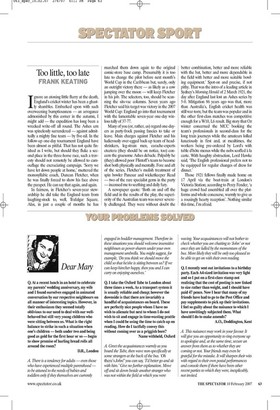Too little, too late
FRANK KEATING Ignore an atoning little flurry at the death, England's cricket winter has been a ghastly shambles. Embarked upon with such overweening bumptiousness — an arrogance admonished by this corner in the autumn, I might add — the expedition has long been a wrecked write-off all round. The Ashes urn was spinelessly surrendered — against admittedly a mighty fine team — by five-nil. In the follow-up one-day tournament England have been almost as pitiful. That has not quite finished as I write, but should they fluke a second place in the three-horse race, such a travesty should not remotely be allowed to camouflage the excruciating campaign. 'Sony we have let down people at home,' muttered the monosyllabic coach, Duncan Fletcher, when he was finally forced to show his face above the parapet. He can say that again, and again.
In fairness, in Fletcher's seven-year stewardship he did take the England team from laughing-stock to, well, Trafalgar Square. Alas, in just a couple of months he has marched them down again to the original comic-store base camp. Presumably it is too late to change the pilot before next month's World Cup in the Caribbean but, surely, only an outright victory there — as likely as a cow jumping over the moon — will keep Fletcher in his job. The selectors, too, should be scanning the sits-vac columns. Seven years ago Fletcher said his target was victory in the 2007 World Cup: England go into that tournament with the lamentable seven-year one-day winloss tally of 37-77.
Many of you (or, rather, us) regard one-dayers as party-frock passing fancies to take or leave. Main charges against Fletcher and his ludicrously over-egged back-up team of headshrinkers, leg-strain men, earache-experts etcetera (they should be on notice, too) concern the gruesome Ashes debacle. Palpably he (they) allowed poor Flintoff's team to become shot both physically and mentally. Fore and aft of the series, Fletcher's mulish treatment of spin bowler Panesar and wicketkeeper Read — two of the rare specialist gems in the party — incensed me to seething and daily fury.
A newspaper quote: 'Both on and off the field and in the results of the play, the superiority of the Australian team was never severely challenged. They were without doubt the better combination, better and more reliable with the bat, better and more dependable in the field with better and more suitable bowling equipment.' Spot-on and precise, if not pithy. That was the intro of a leading article in Sydney's Morning Herald of 2 March 1921, the day after England last lost an Ashes series by 5-0. Mitigation 86 years ago was that, more than Australia's, English cricket health was still war-torn; but the team was popular and in the other first-class matches was competitive enough for a W10, L6 result. Big story that Oz winter concerned the MCC booking the team's professionals in second-class for the long train journeys while the amateurs lolled luxuriously in first and, at mealtimes, the workers being pre-ordered by Lord's with table d'hôte menus while the nobs scoffed a la carte. With haughty abstraction, Lord Hawke said, The English professional prefers not to be equipped for regular changes of dress for dinner.'
Those 1921 fellows finally made home on 17 April via the boat-train at London's Victoria Station; according to Percy Fender, 'a huge crowd had assembled all over the platforms and whole concourse, warmly to give us a rousingly hearty reception'. Nothing similar this time, I'm afraid.













































 Previous page
Previous page